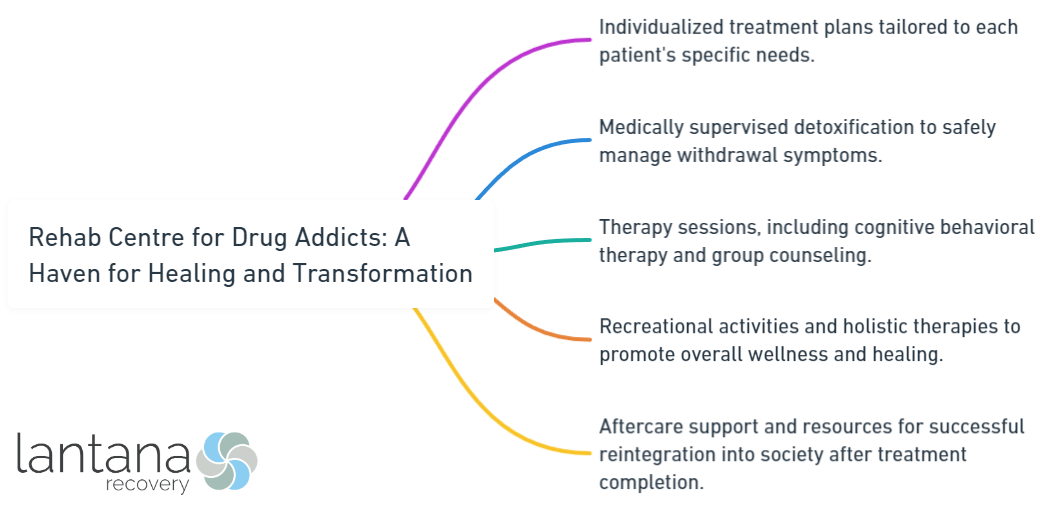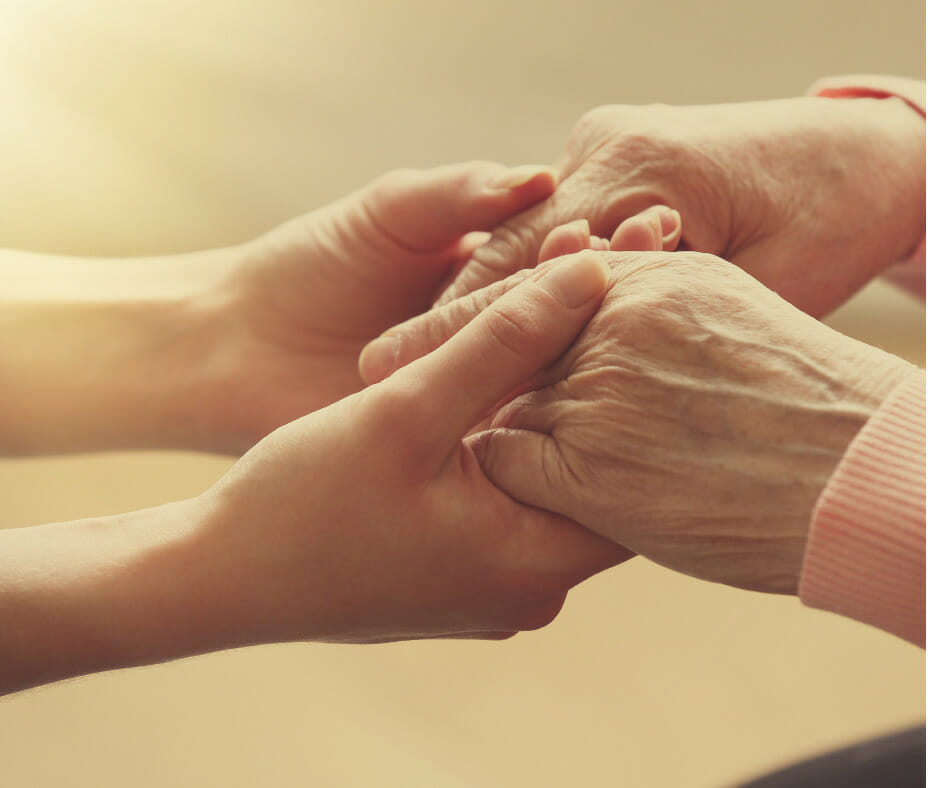Introduction: Understanding the Need for Rehab Centers for Drug Addicts
Rehabilitation centers for drug addicts play a crucial role in providing a haven for healing and transformation. Substance abuse and addiction are significant challenges that affect individuals physically, mentally, and emotionally. To overcome these challenges and regain control of their lives, drug addicts often require professional help, guidance, and support.
A rehab center for drug addicts is a specialized facility that offers comprehensive treatment programs and resources to help individuals overcome their addiction and achieve lasting recovery. These centers provide a safe and supportive environment where individuals can receive the necessary care, support, and therapeutic interventions to address the underlying causes of their addiction.
Understanding the different types of rehab centers and the programs they offer is essential in recognizing the importance of these centers. There are various types of rehab centers, such as inpatient facilities, outpatient programs, and residential treatment centers. Each type offers different levels of care and support tailored to meet the unique needs of individuals seeking recovery.
The importance of rehab centers for drug addicts lies in their ability to provide a holistic approach to treatment. These centers are equipped with a multidisciplinary team of professionals, including doctors, therapists, counselors, and support staff, who work together to create structured treatment plans for each individual.
Rehab centers offer a range of services, including counseling and therapy sessions, detoxification assistance, life skills training, and aftercare programs. By addressing both the physical and psychological aspects of addiction, these centers aim to help individuals break free from their dependence on drugs and build a foundation for a healthy and fulfilling life.
Choosing the right rehab center is crucial for the success of the recovery journey. Factors such as location and environment, accreditation and licensing, treatment approaches, and staff qualifications and expertise should be considered when seeking help.
Successful stories of transformation in rehab centers highlight the profound impact these centers can have on individuals’ lives. By providing a supportive and nurturing environment, rehab centers empower individuals, instilling hope, and facilitating lasting change.
While completing a rehab program marks an important milestone, the journey to recovery continues after leaving the center. Aftercare programs and relapse prevention strategies play a vital role in supporting individuals in their long-term sobriety and helping them navigate the challenges and temptations that may arise.

What is a Rehab Centre for Drug Addicts?
In the world of addiction recovery, rehab centers serve as sanctuaries for individuals seeking healing and transformation. Let’s dive into what makes a rehab center for drug addicts such a pivotal stepping stone towards recovery. Unveiling the distinct types of rehab centers and exploring the diverse programs they offer, we’ll uncover the myriad pathways to recovery and the possibilities that lie ahead for those on their journey towards a better life.
Types of Rehab Centers
Types of Rehab Centers
There are various types of rehab centers available to cater to different needs and preferences of drug addicts. Some common types include:
-
Inpatient Rehab Centers: These residential facilities provide 24/7 supervision, structured treatment programs, and a supportive community. Individuals stay for a period of 30 days to several months.
-
Outpatient Rehab Centers: Individuals can live at home while receiving treatment at outpatient rehab centers. These centers offer flexibility for individuals with work or family commitments who still require regular therapy sessions and support.
-
Luxury Rehab Centers: These facilities offer high-end amenities and accommodations along with comprehensive addiction treatment programs. They provide a comfortable and exclusive environment.
-
Dual Diagnosis Rehab Centers: These centers specialize in treating individuals with co-occurring mental health disorders, such as depression or anxiety, alongside addiction. They address both the addiction and underlying mental health issues.
When choosing a rehab center, it’s important to assess your specific needs and goals to determine the most beneficial facility for your recovery journey. Consider factors such as the severity of the addiction, the level of support needed, and any co-occurring mental health conditions. Consulting with a healthcare professional can also help guide you in selecting the most suitable rehab center for your needs.
Programs Offered
Residential Participants have the opportunity to live at the rehab center for a specific duration and engage in therapeutic activities, counseling, and support.
Outpatient Participants can choose to live at home while attending treatment sessions at the rehab center. This option is suitable for individuals with a strong support system and who need to fulfill their daily responsibilities.
Individual Therapy One-on-one counseling sessions between the participant and a licensed therapist are available to address specific issues and challenges.
Group Therapy Participants have the option to engage in therapy sessions with a group of individuals who are facing similar struggles, providing a supportive and empathetic environment.
12-Step Based on a self-help and support approach through a structured 12-step program, participants can work towards sobriety and recovery.
Dual Diagnosis Treatment These programs are specifically designed for individuals with co-occurring mental health disorders and substance abuse. They address both conditions simultaneously.
Holistic Therapies Rehab centers may offer a range of holistic therapies, such as yoga, meditation, art therapy, and equine therapy, to enhance well-being and promote healing.
Family Therapy This type of therapy involves including family members in the treatment process to improve communication, address dynamics, and provide support.

The Importance of Rehab Centers for Drug Addicts
Rehabilitation centers play a crucial role in the journey of drug addicts towards healing and transformation. From creating a secure and nurturing environment to implementing tailored treatment plans, these centers offer the support needed to overcome addiction. Through various counseling and therapy techniques, they help individuals navigate their emotions and underlying causes of substance abuse. Additionally, rehab centers provide assistance with detoxification, aiding in the physical recovery process. With such comprehensive approaches, these facilities serve as beacons of hope for those seeking a path to recovery.
Providing a Safe and Supportive Environment
Rehab centers for drug addicts prioritize providing a safe and supportive environment. These centers understand that individuals struggling with addiction need security and support to overcome their challenges.
– Rehab centers prioritize patients’ safety with strict security measures, drug-free premises, and monitoring to prevent harm.
– The staff is compassionate, dedicated professionals who provide emotional support, guidance, and encouragement throughout treatment.
– Individuals connect with others facing similar experiences, fostering a supportive community and a sense of belonging.
– Rehab centers create a space to explore addiction causes and develop coping mechanisms through group therapy and individual counseling.
– Rehab centers offer continuous supervision for immediate intervention in emergencies or relapse triggers.
When choosing a rehab center, prioritize a safe and supportive environment. Consider reputation, staff qualifications, individualized treatment plans, and success rates of previous patients. A safe and supportive environment is vital for recovery and healing.
Implementing Structured Treatment Plans
When it comes to rehab centers for drug addicts, the implementation of structured treatment plans is crucial for achieving effective recovery. Here are the steps involved to ensure the success of these plans:
1. Assessment: It is essential to conduct a thorough assessment of the individual’s needs, taking into account their substance abuse history, physical and mental health, as well as any co-occurring disorders.
2. Goal Setting: The next step is to establish specific goals that will serve as a roadmap for the individual’s recovery journey and guide their treatment plan.
3. Individualized Plans: Each person’s needs are unique, which is why it is important to tailor the treatment plans accordingly. This includes incorporating evidence-based therapies, counseling, medication management, and any other necessary interventions.
4. Regular Therapy Sessions: Holding regular individual and group therapy sessions plays a significant role in addressing underlying issues that contribute to addiction. It also helps individuals develop effective coping mechanisms.
5. Education and Skill Building: Providing education on addiction, relapse prevention, and life skills development equips individuals with the necessary tools for successful recovery.
6. Monitoring and Adjustments: Regularly monitoring treatment plans is essential to ensure progress and make necessary adjustments to tackle challenges that may arise.
7. Transition and Aftercare: Developing a comprehensive aftercare plan is crucial to support individuals as they transition back into the community. It also provides ongoing support to help them maintain their sobriety.
By implementing structured treatment plans in rehab centers, a comprehensive and individualized approach to recovery can be achieved, greatly increasing the chances of long-term success.
John’s story stands as a powerful inspiration. Through the structured treatment plan provided by a rehab center, he was able to overcome his addiction. With the guidance of dedicated therapists and the support of fellow participants, John actively attended regular therapy sessions, remained focused on his goals, and diligently developed the necessary skills to maintain his sobriety. The structured treatment plan provided him with a solid framework for success and enabled him to rebuild his life. Today, John leads a fulfilling and addiction-free life, serving as a testament to the immense power of a well-implemented treatment plan in rehab centers.
Offering Counseling and Therapy
Offering counseling and therapy is crucial for drug rehab centers. Here are the benefits of counseling and therapy for individuals seeking recovery:
– Emotional support: Counseling and therapy provide a safe space for individuals to express their emotions. Trained therapists can guide them through the challenges of recovery.
– Identifying underlying issues: Many individuals turn to drugs to cope with mental health issues or trauma. Through counseling and therapy, addicts can address these causes, helping them overcome addiction.
– Developing coping mechanisms: Counseling and therapy provide tools to cope with cravings, triggers, and setbacks. Individuals learn healthy ways to manage stress, emotions, and relationships, empowering them for long-term sobriety.
– Building a support network: Group therapy connects individuals with others facing similar struggles, fostering accountability and encouragement.
If you or a loved one are considering rehab, prioritize a facility that offers comprehensive counseling and therapy services. Look for centers with licensed therapists experienced in addiction treatment. Inquire about the availability and frequency of counseling sessions to align with your needs and preferences.
Assisting with Detoxification
When it comes to detoxification, rehab centers for drug addicts play a crucial role. They provide necessary support and care through medical supervision, a safe environment, individualized treatment plans, and emotional support.
– Medical supervision: Rehab centers have medical professionals who closely monitor the detoxification process. They administer medications and treatments to alleviate withdrawal symptoms and ensure the individual’s safety and well-being.
– Safe environment: Rehab centers provide a controlled environment, eliminating exposure to triggers and temptations and reducing the chances of relapse during withdrawal.
– Individualized treatment plans: Rehab centers recognize that each person has unique detoxification needs. They create customized treatment plans to cater to these specific needs, ensuring a more effective detoxification process.
– Emotional support: Detoxification can be mentally and emotionally challenging. Rehab centers offer counseling and therapy sessions to help individuals cope with the emotional rollercoaster. These sessions provide a safe space to express feelings, learn coping mechanisms, and gain support from peers and professionals.
One success story that exemplifies the power of rehab centers in assisting with detoxification is Sarah’s journey to recovery. Sarah had a severe addiction to opioids for many years and sought help at a reputable rehab center known for its holistic approach.
Throughout her detoxification process, Sarah received round-the-clock medical supervision and support. The experienced medical team closely monitored her withdrawal symptoms and adjusted her medication accordingly. Sarah also attended therapy sessions to address the underlying causes of her addiction.
Thanks to the compassionate and dedicated staff at the rehab center, Sarah successfully completed her detoxification journey. She was equipped with the necessary tools and strategies to maintain sobriety even after leaving the center. Today, Sarah leads a fulfilling life, free from addiction, all because of the assistance she received during detoxification at the rehab center.

Seeking Help: How to Choose a Rehab Centre
Looking to find the perfect rehab center for yourself or a loved one? In this section, we’ll be diving deep into the essential factors that will guide your decision-making process. From exploring the ideal location and environment to examining the crucial aspects of accreditation, licensing, and treatment approaches, we’ll help you navigate the overwhelming choices. Additionally, we’ll shed light on the importance of staff qualifications and expertise, ensuring you have the necessary insights to make an informed decision. Get ready to embark on a journey of healing and transformation!
Location and Environment
To choose a rehab center for drug addicts, it is important to carefully consider the location and environment. The location and environment play a crucial role in the recovery process and overall well-being of the individuals seeking treatment.
One key aspect to consider is the accessibility of the rehab center. It should be easily reachable for both the individuals and their families. This ensures that necessary support systems are readily available and also encourages active family participation in the treatment process.
In addition, the rehab center should provide a serene and calm environment, free from distractions and triggers. Such an environment promotes relaxation and facilitates the healing process.
Furthermore, a rehab center situated in a beautiful natural setting can have a positive impact on the recovery process. The presence of green spaces or scenic views creates a soothing atmosphere that aids in the healing journey.
Another crucial factor is the emphasis on privacy and confidentiality. The rehab center should prioritize these aspects, offering a discreet location that provides individuals with a sense of security. This allows them to focus on their recovery without any fear of judgment or breach of privacy.
Lastly, the community surrounding the rehab center should be understanding and supportive. A supportive community provides an additional layer of support during the recovery process, enhancing the chances of successful treatment outcomes.
Considering the location and environment when choosing a rehab center greatly influences the overall success of the treatment. It is important to find a facility that aligns with the individual’s specific needs, providing a conducive and supportive environment for healing and transformation.
Accreditation and Licensing
Accreditation and licensing are essential factors to consider when selecting a rehab center for individuals struggling with drug addiction. These certifications serve as a guarantee that the facility adheres to stringent quality and safety standards.
When choosing a rehab center, it is important to prioritize accreditation. Look for facilities that have obtained accreditation from well-known organizations such as CARF or the Joint Commission. This accreditation signifies that the rehab center meets rigorous standards and is dedicated to providing exceptional care.
Additionally, verifying the licensing of the rehab center is crucial. Ensure that the facility is licensed by the appropriate regulatory body. This ensures that the rehab center operates legally and follows the guidelines set by the state.
Accreditation and licensing also involve ongoing monitoring and evaluation of treatment programs, which contribute to quality assurance. These processes ensure that the rehab center maintains the necessary standards and offers effective, evidence-based treatment for individuals struggling with drug addiction.
Furthermore, accreditation and licensing provide individuals seeking help with trust and credibility. Knowing that the rehab center has undergone a comprehensive review process, individuals can have confidence in the facility’s commitment to providing safe and effective treatment.
Treatment Approaches
When it comes to rehab centers for drug addicts, there are various treatment approaches available to cater to the individual needs of each patient:
– Medication-Assisted Treatment (MAT): This approach combines medication with behavioral therapy to address substance use disorders. MAT reduces cravings and withdrawal symptoms.
– Cognitive-Behavioral Therapy (CBT): CBT focuses on changing negative thought patterns and behaviors associated with drug addiction. It develops coping strategies to prevent relapse.
– Contingency Management: This approach uses positive reinforcement to encourage healthy behaviors and discourage substance abuse. Patients receive rewards for maintaining abstinence.
– 12-Step Facilitation: This approach incorporates principles from Alcoholics Anonymous (AA) and Narcotics Anonymous (NA) to create a supportive community for individuals recovering from addiction.
– Motivational Interviewing: This approach involves a collaborative conversation between therapist and patient to enhance motivation and commitment to change.
These treatment approaches are often combined or tailored to ensure the best outcomes for individuals. Research from the National Institute on Drug Abuse (NIDA) has shown that combining medication-assisted treatment with behavioral therapy is the most effective approach for treating opioid addiction.
Staff Qualifications and Expertise
When choosing a rehab center for drug addiction, it is crucial to consider the qualifications and expertise of the staff. The staff’s expertise is vital in providing effective treatment and support to individuals seeking recovery.
– Education and Training: The staff should possess appropriate education and training in addiction treatment. They should have degrees or certifications in addiction counseling, psychology, social work, or related fields. This ensures they have the knowledge and skills necessary to address complex issues associated with drug addiction.
– Experience: Consider the staff members’ experience. Experienced professionals can adapt their approach and provide personalized care due to their exposure to various individuals and situations.
– Specializations: Some staff members may have specialized knowledge in dual diagnosis (treating co-occurring mental health disorders), trauma-informed care, or alternative therapies. These specializations enhance treatment options.
– Continuous Professional Development: The best rehab centers prioritize ongoing professional development for their staff. This keeps the staff up-to-date with the latest research, treatment approaches, and best practices in addiction treatment.
– Compassion and Empathy: In addition to qualifications and expertise, staff must demonstrate compassion and empathy towards individuals in recovery. Creating a safe and supportive environment greatly contributes to the treatment process’s success.
A true story highlighting the importance of staff qualifications and expertise is John’s transformation. John struggled with opioid addiction and was assigned a counselor at a reputable rehab center who specialized in opioid addiction treatment. The counselor’s in-depth understanding of the challenges and withdrawal symptoms associated with opioids allowed them to tailor a treatment plan for John’s specific needs. With the guidance and support of the highly qualified staff, John successfully completed the program and has been in recovery for over a year. The staff’s expertise played a crucial role in his healing and transformation journey.

Success Stories: Transformations in Rehab Centers
Success stories of transformations in rehab centers serve as powerful evidence of the effectiveness of these facilities in helping individuals conquer their drug addiction and achieve a healthier, more satisfying life. The success lies in the incorporation of physical and mental well-being, psychological growth, the building of a support system, and the development of essential life skills.
Rehab centers address the physical health concerns of those who enroll, as substance abuse often takes a toll on their well-being. Through nutritional improvements, exercise regimens, and overall health management guidance, individuals can regain their physical well-being and vitality.
Moreover, rehab centers prioritize the mental and emotional well-being of their clients. They facilitate counseling sessions, group therapy, and behavioral interventions that enable individuals to delve into the root causes of their addiction. By doing so, they can develop effective coping mechanisms and cultivate a positive mindset, fostering psychological growth.
Creating a strong support system is a fundamental aspect of rehab centers. Encouraging individuals to connect with fellow peers, form meaningful bonds, and share their experiences generates a nurturing environment that fosters personal growth and sobriety.
Additionally, rehab centers equip individuals with essential life skills to aid in their reintegration into society post-treatment. They provide education and training in areas such as communication, problem-solving, relapse prevention strategies, and goal-setting. These skills are vital for individuals to successfully navigate their lives after completing their program.
It is essential to note that while rehab centers play a crucial role in the recovery process, the ultimate success relies on the individual’s commitment, willingness to enact change, and ongoing support from loved ones. Seeking long-term support, such as joining support groups or engaging in therapy, further enhances the probability of maintaining sobriety and leading a fulfilling life.

Life After Rehab: Continuing the Journey to Recovery
Transitioning from a rehab center to life after rehab is an essential step in the journey of recovery. In this section, we will explore the aftercare programs and support available to aid individuals in staying on track with their sobriety. Additionally, we will delve into the crucial topic of relapse prevention strategies, equipping readers with valuable tools and insights to maintain a healthy and drug-free lifestyle. With the right guidance and resources, the path to lasting recovery becomes brighter and more attainable.
Aftercare Programs and Support
After completing a rehab program for drug addiction, individuals heavily rely on aftercare programs and support to sustain their continued recovery. These aftercare programs offer ongoing assistance and guidance, aiming to help individuals effectively maintain their sobriety and successfully navigate the challenges of reintegrating into their daily lives.
When assessing aftercare programs and support, it is important to consider the following key factors:
1. Continued therapy: Aftercare involves individual counseling and group therapy sessions, which address emotional and psychological issues while providing constant support.
2. Support networks: These aftercare programs foster a sense of community and mutual support by connecting individuals who are in recovery.
3. Education and relapse prevention strategies: Aftercare equips individuals with necessary knowledge and tools to identify triggers, develop coping mechanisms, and effectively prevent relapse.
4. Holistic approach: Many aftercare programs adopt a holistic approach by incorporating practices such as meditation, mindfulness, or exercise to promote overall well-being and enhance the recovery process.
5. Family involvement: The inclusion of family members in aftercare programs strengthens relationships, improves communication, and establishes a solid support system.
Selecting the appropriate aftercare program is vital for achieving long-term recovery and overall success. It is crucial to consider individual needs, preferences, and the availability of program options within your local area.
Pro tip: When exploring aftercare programs and support, reach out to local support groups, addiction counselors, or treatment centers for recommendations and guidance. They possess valuable insights and can connect you with suitable resources that cater to your specific situation.
Relapse Prevention Strategies
When it comes to overcoming addiction, relapse prevention strategies are crucial for maintaining long-term sobriety. Here are effective strategies to help individuals stay on the path to recovery:
1. Develop a strong support system: Surround yourself with supportive family, friends, and peers who understand the challenges of addiction. They can provide encouragement, accountability, and a sense of belonging.
2. Attend regular therapy sessions: Engage in ongoing therapy to identify triggers, develop coping mechanisms, and address underlying issues that contribute to relapse.
3. Practice stress management techniques: Learn and regularly practice stress management techniques such as deep breathing exercises, meditation, yoga, or engaging in enjoyable hobbies and activities to better manage stress without turning to substances.
4. Create a relapse prevention plan: Work with healthcare professionals to develop a personalized plan that includes strategies like avoiding certain environments, recognizing early warning signs, and implementing alternative coping mechanisms.
5. Maintain a healthy lifestyle: Take care of your physical well-being to positively impact mental health and reduce the risk of relapse. This includes adopting a balanced diet, regular exercise, sufficient sleep, and avoiding substances.
6. Participate in support groups: Join support groups like Alcoholics Anonymous (AA) or Narcotics Anonymous (NA) to find a sense of community, share experiences, find inspiration, and receive ongoing support during the recovery journey.
7. Avoid high-risk situations: Identify and avoid situations, people, or environments that may trigger cravings or temptations to use substances. This may involve avoiding certain social settings, cutting ties with enablers, and making necessary lifestyle changes.
By implementing these strategies, individuals can greatly enhance their chances of maintaining abstinence and achieving long-term recovery.
Frequently Asked Questions
Q: What kind of care does a rehab center for drug addicts provide?
A: A rehab center for drug addicts provides compassionate care and support for individuals seeking treatment for substance abuse disorders. The center offers a patient-centered approach, focusing on individual needs and providing personalized treatment plans. Highly trained and experienced mental health counselors lead programs that promote living abundant and independent lives.
Q: How does a rehab center help individuals recover from underlying mental health issues?
A: A rehab center understands the importance of maintaining good mental health and aims to help clients recover from underlying mental health issues. Through a combination of individual and family counseling, group therapy, and an intensive outpatient program, the center’s licensed clinicians address the root causes of addiction and provide support for long-term recovery.
Q: What is the role of family support in the transformation process?
A: Family support plays a crucial role in the transformation process. Rehab centers not only provide care for the individual seeking treatment but also offer information and education to family and friends to support the recovery process. By involving loved ones, the center aims to improve overall wellness for all involved and promote a strong support system.
Q: What is the importance of continuing care planning in addiction treatment?
A: Continuing care planning is essential in addiction treatment as it ensures ongoing support and helps individuals maintain their recovery progress. Rehab centers, such as Alta Mira, provide tailored continuing care plans to meet individual needs. These plans may include weekly alumni support meetings, quarterly workshops, and lifelong support after completing the treatment program.
Q: Does insurance cover the cost of treatment at a rehab center?
A: Yes, many rehab centers are covered by insurance, including Medicaid and Medicare. New Era Rehabilitation Center is one such facility that accepts insurance. It is important to check with individual insurance providers regarding coverage details and any specific requirements for treatment at a rehab center.
Q: How can an individual start the recovery process at a drug rehab center?
A: To start the recovery process at a drug rehab center, an individual can reach out for professional help by calling the provided addiction support hotline. Rehab centers like New Era Rehabilitation Center and Sanctuary of Transformation offer comprehensive programs and care. Taking the first step to seek help is crucial in the transformation and healing journey.








